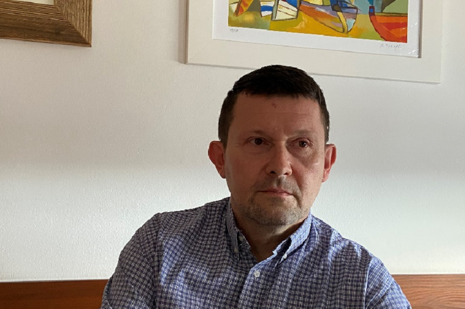
Gordan joined IATA in 1998 as BSP Manager Croatia after working at Atlas American Express in their Card Division.
He currently sits in Zagreb, Croatia where he covers Slovenia, Croatia, Montenegro, Serbia, Bosnia and Herzegovina, North Macedonia, Kosovo and Albania. IATA member airlines in this cluster include Croatia Airlines, Air Serbia and Montenegro Airlines.
Gordan in his own words:
“After inaugurating the BSP operation in Croatia from IATA’s Zagreb office, I assisted in establishing the BSP in Slovenia. It wasn’t until 2006 that we launched one for the Western Balkans. This actually turned out to be a very dynamic period because after initially managing one country, we ended up handling eight of them! We later went through a restructuring phase leading to closing the local office. I decided to stay in Zagreb, working from home, therefore I was quite prepared to face the recent lockdown!
On a personal side, I enjoy many aspects of music - concerts, listening at home and collecting musical instruments. Also, I love outdoor activities, both water and mountain sports. Spear fishing, scuba diving, mountain biking, hiking, powder skiing are my favorite ones.“
***
Gordan, thanks for taking the time to answer our questions, particularly in such challenging times.
As in most, if not all of Europe, the Covid-19 crisis has caused unprecedented disruption in aviation as well as in other aspects of life. As the countries in my cluster heavily rely on tourism, the epidemic has created serious challenges for their economies. Although we want to look at the future with optimism, caution is needed. We have witnessed this cautious trend in the industry, as we still lack a complete understanding of the virus, its properties and effects, which will probably be the case for some time, though we all hope for a rapid solution like a vaccine.
To start off, I would like to thank governments for their support during these difficult times. Aviation is widely recognized as one of the key elements of a successful economy, and this translated into an even more constructive cooperation. Naturally, it can vary from country to country, but generally, everyone understands the value that aviation brings.
I would say that our situation is very similar to other parts of Europe. Although vouchers might not be the preferred option for some people in these challenging times, they can at least offer a temporary solution to bridge us to a future situation when Airlines amplify their operations and start creating revenues once more. Insisting on enforcing the EU261 regulation on passenger rights is not beneficial for the present or the near future. The most important thing currently is to preserve connectivity because it is crucial for the economic recovery and much more. We put a lot of effort in order to advocate for greater flexibility regarding vouchers. This topic is even more important in my cluster where, in addition to the dependence on tourism, connectivity is not at par with other areas of Europe.
In parallel, airlines should demonstrate their openness to offer fair options to their customers to ensure a solution for the benefit of all parties involved in order to overcome this difficult period.
My cluster comprises both EU and non-EU countries, therefore the restart measures and next steps are evolving at a slightly different pace. EU countries have already witnessed the reopening of some routes. Non-EU countries are trying to follow in these footsteps but are limited by the number of routes until the EU countries lift travel restrictions. On a positive note, we are seeing European countries improve from an epidemiological perspective, and we expect more routes will reopen in the coming days and weeks.
The most recent case is the unfortunate bankruptcy of Adria Airways. The impact is quite serious on both the area’s connectivity and economy due to the fact the airline served this entire region. As most countries here deeply depend on tourism and inbound travel, every bit of connectivity is key. The Covid-19 crisis further amplifies this issue. We expect a global economic recession but want to believe next year brings more optimistic winds.
Some forecasts in Croatia depict a worrying picture, saying reaching 30% of the 2019 visitor figures would actually be a good result. On a more optimistic note however, all the countries in my cluster have recorded very good numbers in terms of epidemiologic recovery and the Covid-19 situation in general. This is extremely important for both the local population and potential tourists who could find these countries even more desirable vacation destinations in the current European and global context.
Additional information: